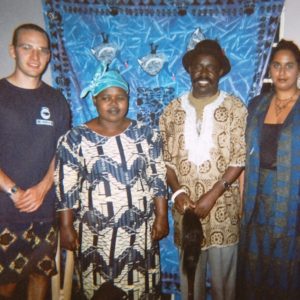What do you cook,
when a chief comes to dinner?

A man of power may be right or wrong,
but he is always right –
Bambara of Mali
We had been living in Zambia for about a year. We were working as lecturers at a Ministry of Education teacher training college, at a rural town in the North Western Province. It was about 60 kms from the border with DRC. At the time, the AIDS/HIV pandemic was having a devastating effect in the country and many teachers were dying. As a result, new teachers could not be trained up fast enough. The trainees spent one academic year at the college with us, learning teaching methodologies and then were posted for a second year of teaching experience at government schools in the province.
We met Jonathan Eshiloni Mumena during our fist year in Zambia. He was management at the office in town for the phone service, Zamtel. Our phone line had been promised to us but it was taking several months to get connected. We did not know that he was the local tribal chief for the kaonde tribe in the area, and the nearest thing to an A list celebrity in our town. He is a respected, traditional leader and we were supposed to kneel and clap our hands as a sign of respect when we greeted him.
Instead I strode confidently into his office and greeted him with a firm hand shake. Looking back, he must have found that quite funny. And we became firm friends.
Chief Mumena is a prominent figure in the community’s fight against HIV/AIDS. He was involved in many initiatives to promote HIV education. We worked to equip a resource room and designed an HIV education workshop that we rolled out to over 1,110 trainee teachers. He was there as our Guest of Honour at the resource room’s official opening. He encouraged us to facilitate a play, where lecturers acted on stage, delivering a clear message on HIV awareness to our trainee teachers and the community. He was a constant support of all the work we were trying to do.
Zambia prides itself on being ‘the real Africa’. Family were visiting from U.K and they wanted to have an authentic experience, instead of just 5* hotel plus safari. So when they travelled to our house, we invited the local chief to join us for dinner. He graciously accepted the invitation.
Then I was faced with a bit of a dilemma; What do you cook, when a chief comes to dinner? The traditional staple food was nshima, maize meal. I imagined he would eat that on most days. I wanted to cook something special, as well as something that my in-laws would enjoy. We decided on a traditional English roast.
Preparing a full roast dinner in our little Zambian kitchen was no mean feat. We didn’t have an Aga or a sophisticated stove, just a two ring mini oven, perched on top of an old college desk. And while we were luckier than most, actually having electricity a lot of the time, frequent power cuts meant that the threat of the lecky suddenly going off was looming over us. As a back up, we had a charcoal brazier, a small burner which our guards used to sit by to keep warm during the night. All was going quite well, the table was set and things were going to plan.
The chief, along with his wife arrived on time. We were not used to anyone being on time in Zambia. If I’m honest, I was more than a little nervous. We so wanted everything to go well and hoped that everyone would get on. Formal introductions were made. Then the chief presented my in-laws with a gift, a locally crafted reed mat. Next we took photographs, obligatory at any special occasion in Zambia.
Meat was carved. Gravy was poured. We passed the spuds.
It was a humble meal. I’m not sure if it was befitting of a chief. But over that ordinary meal, conversation flowed. The chief shared informed ideas about development. He was compassionate leader, with a clear vision, who wanted the best for his people. To us, he was a local hero.
When we left Zambia at the end of that year we didn’t stay in contact. This was pre-emails and cell phones. A few years later my Mother in Law showed me a feature in a glossy magazine. Chief Mumena was in the photo smiling, standing next to Geri Halliwell, a UN Ambassador, working to promote awareness of the need to reduce maternal death and halt the spread of HIV in Zambia.
And then last year, when I was researching a few facts for the blog piece on TB, I came across an article by Bill Gates. He wrote how “Chief Mumena is one of his country’s most respected traditional leaders, and he has been using his voice to encourage Kaonde men to embrace voluntary medical male circumcision as a strategy to prevent HIV transmission”.
A clear link has been made between male circumcision and HIV. Apparently the procedure can reduce a man’s risk of acquiring or transmitting HIV by up to 60 percent.
Bill Gates has published this piece on Chief Mumena on You Tube. He calls Chief Mumena a hero in the field.
Our local hero, had become an international one.
Have you met a local hero, where you have lived or travelled?
©Maggie M / Mother City Time